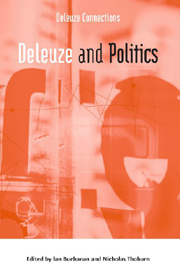Book contents
- Frontmatter
- Contents
- Dedication
- Acknowledgements
- Introduction: Deleuze and Politics
- 1 Power, Theory and Praxis
- 2 Deleuze and the Political Ontology of ‘The Friend’ (philos)
- 3 Molecular Revolutions: The Paradox of Politics in the Work of Gilles Deleuze
- 4 Schizoanalysis, Nomadology, Fascism
- 5 What is a Militant?
- 6 Bourgeois Thermodynamics
- 7 The Age of Cynicism: Deleuze and Guattari on the Production of Subjectivity in Capitalism
- 8 Deleuze, Materialism and Politics
- 9 Becoming-Democratic
- 10 Theorising European Ethnic Politics with Deleuze and Guattari
- 11 People and Fabulation
- 12 Micropolitical Associations
- Notes on Contributors
- Index
12 - Micropolitical Associations
Published online by Cambridge University Press: 12 September 2012
- Frontmatter
- Contents
- Dedication
- Acknowledgements
- Introduction: Deleuze and Politics
- 1 Power, Theory and Praxis
- 2 Deleuze and the Political Ontology of ‘The Friend’ (philos)
- 3 Molecular Revolutions: The Paradox of Politics in the Work of Gilles Deleuze
- 4 Schizoanalysis, Nomadology, Fascism
- 5 What is a Militant?
- 6 Bourgeois Thermodynamics
- 7 The Age of Cynicism: Deleuze and Guattari on the Production of Subjectivity in Capitalism
- 8 Deleuze, Materialism and Politics
- 9 Becoming-Democratic
- 10 Theorising European Ethnic Politics with Deleuze and Guattari
- 11 People and Fabulation
- 12 Micropolitical Associations
- Notes on Contributors
- Index
Summary
Whether Deleuze and Guattari's concept of micropolitics can be regarded as a significant contribution to current philosophical debates around the questions of democracy and political action is the subject of considerable debate. While many interpreters (Patton 2000; Hayden 1998; Antonioli 2003; Holland 2006) emphasise the post-Marxist and radical democratic tenor of the concepts developed in Anti-Oedipus and A Thousand Plateaus, others, in contrast, contest their political relevance. Critics like Todd May or Philippe Mengue consider micropolitics to be lacking in political content insofar as it tends to reduce the transformatory political processes of social interaction, decision-making and the definition of political claims and purposes to a merely anarchistic or dissolutive escapism. In light of this debate, it might be useful to review the concept of micropolitics in more detail, paying particular attention to its formative context. Thus we will begin by investigating to what extent the micropolitics promoted by Deleuze and Guattari intersects with the Foucauldian concept of power. We will then confront Deleuze's problematisation of power and resistance with theories of radical democracy and democratic becoming. We thereby want to highlight certain aspects which – for us – characterise Deleuze and Guattari's original and genuine approach to the political. Finally, we will investigate the political impact of this approach in terms of associations, understood as relational, interactive and virtual assemblages capable of subverting and transforming manifest or majoritarian structures of power.
- Type
- Chapter
- Information
- Deleuze and Politics , pp. 240 - 254Publisher: Edinburgh University PressPrint publication year: 2008



